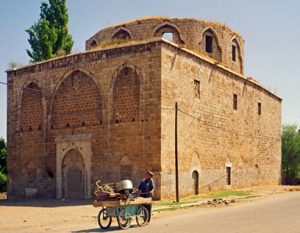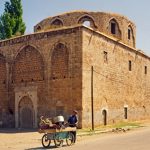
Holy Trinity Armenian Church, in Armenian quarter of Malatya, Turkey (Elbrecht, www.fresnostate.edu)
ISTANBUL, Turkey (Morning Star News) – Christians in Turkey who were shocked to learn that the confessed killers of three Christians would be released on bail under a new law are more at ease as the suspects are effectively under house arrest, a Christian leader said.
A reform law signed into effect on March 6 by President Abdullah Gul reduced the allowable period of pretrial detention from 10 years to five. The next day, five suspects in the 2007 Zirve Publishing House massacre in Malatya – Emre Günaydın, Cuma Özdemir, Hamit Çeker, Salih Gürler and Abuzer Yildirim – were released from jail after years of delay tactics by their defense team and possibly others.
Under public pressure, authorities effectively put the men under house arrest by requiring them to wear electronic monitoring devices.
On April 18, 2007, the five suspects entered the third-story office of the Zirve Publishing House and tied up Necati Aydin, Ugur Yuksel and Tilmann Geske. The suspects tortured and interrogated the three men about their Christian activities, and then as police arrived slit the Christians’ throats and fled, according to court testimony.
Aydin and Yuksel were both Turkish converts from Islam. Yuksel was engaged to be married, and Necati was married and had two children. Tilmann, a German national, was married with three children. His wife Susanne, who decided to remain in Malatya after the slayings, initially expressed concern that about the release of the alleged killers.
“At first Susanne was troubled by the release of these men who murdered her husband,” said Umut Sahin, general secretary for the Association of Protestant Churches in Turkey. “But now she is more at peace with what has happened. At least one of the young men continues to verbally threaten the lawyers and families of the victims. If he had been free to go wherever he wanted, she would naturally be worried.”
The next hearing is scheduled for April. There is still some concern that as the verdict approaches, the suspects, who are facing possible life terms, may find ways to leave the country.
According to court records, Günaydın jumped from an office window to the street where he suffered a broken leg and head injuries. Özdemir, Çeker, Gürler and Yildirim were apprehended as they ran from the building, allegedly with knives in their hands.
When interrogated, the five accused men said they attacked the Christians because they were defending their country and religion, Islam, according to court records. From the outset, there was suspicion that the men, all 19 or 20 at the time, committed the acts under the guidance of others. Günaydın testified in court that ultranationalist writer Varol Bülent Aral told him that the publishing house was connected with Kurdish terrorists and convinced him to commit the attack to defend “the motherland.”
The trial was delayed many times as prosecutors pursued different leads. In 2011, a witness provided testimony that connected those behind the Malatya killings to people involved in plots to discredit the national government. There were also several problems with the judicial proceedings, including numerous witnesses for the prosecution declining to show up to testify. Some of those witnesses were under the custody of other government agencies when they were supposed to report to court, arousing suspicions that they were deliberately prevented from testifying.
“There are three main reasons this trial has taken so long,” Sahin told Morning Star News. “The committee of judges overseeing the case has been changed two to three times. Each time it is changed, the new set of judges have to familiarize themselves with the case. Suspects and witnesses who were in the military could not be questioned until years into the case … The defending lawyers have used all kinds of legal tactics to draw out the trial, but we are not aware of any intentional efforts by other bodies to delay the trial.”
The Malatya slaying was not the only case of anti-Christian persecution affected by the new law. Also released on March 6 was Erhan Tuncel, who is accused of being the mastermind behind the death of Armenian journalist Hrant Dink; in January 2007 he was shot outside the offices of the Agos weekly, where he was editor-in-chief.
Sahin said that in spite of the way the new law reducing the time a suspect can be held in detention has backfired in the Malatya case, it was generally positive.
“The Malatya case is an example of the negative results for our specific case,” he said.
###
© 2014 Morning Star News. Articles/photos may be reprinted with credit to Morning Star News.
Morning Star News is a 501(c)(3) non-profit corporation that relies solely on contributions to offer original news reports of persecuted Christians. Our mission is to inform those in the free world and in countries violating religious freedom about Christians worldwide who are persecuted for their faith. For free subscription or to make tax-deductible donations, contact [email protected], or send check to Morning Star News, 24310 Moulton Parkway, Suite O # 157, Laguna Hills, CA 92637, USA.
- Holy Trinity Armenian Church, in Armenian quarter of Malatya, Turkey (Elbrecht, www.fresnostate.edu)


Speak Your Mind